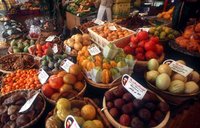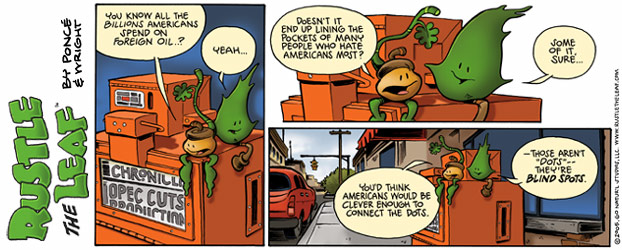FEATURE: Ethical Food?
 In this Saturday's Independent CityHippy gets a quote and a nod (thanks Helen) in a great article about How to buy food that doesn't cost the Earth.
In this Saturday's Independent CityHippy gets a quote and a nod (thanks Helen) in a great article about How to buy food that doesn't cost the Earth.As a bonus to all my blog readers here is the whole set of ethical food issues and tips, as I see them, that I gave to Helen. Obviously she could not use my entire email and I am just pleased to be included at all.
So here it is in all its glory. Enjoy!
How to deal with those CityHippy hunger pangs?
You are in central Anywhere and you need a snack before that interview/concert/whatever. McDonalds? Not bloody likely. Sainsbury's for a quick sarnie? Hardly green, apart from the lettuce.
There are doable green-ish cheap ethical fast-food options:
OK: Pret, whilst being 1/3 owned by McDonalds, offers a lot of fairtrade, fresh, organic, packaging-reduced options. Plus they treat their staff well. And hey the more money McDonalds make from ethical business the better right?
BETTER: Waitrose or M&S in the UK are offering much greener alternatives nowadays.
BEST: Find a local ethical non-chain food shop and support them. Hard to find though.
Further info: Ethical Fast Food?
To meat or not to meat?
Eating meat is just plain bad for the planet. Forests are cut down so cattle can graze. No matter how humane animals are treated in the end they end up dead on your plate. Around 4 kilos of grain are required to produce 1 kilo of pork, and 8 kilos are needed for a kilo of beef. (Source: American Association for the Advancement of Science). There is just not enough land to produce enough meat if we all wanted it.
Being vegetarian is quite possibly the biggest green thing any of us can do...saying that I know it is hard and it is something I struggle with. However I have certainly cut down my meat intake and look forward to the day when I am meat-free.
Further info: Meat Koma Karma
Who produces the food we eat and how are they treated?
Is your food produced under conditions you would be happy to work under i.e. Fairtrade where growers get fair prices that they can use to plan ahead and grow their communities instead of relying on charity etc.
Or do the Chickens wallow in their own wee?
Further info: Supermarket Secrets and Supermarket Secrets Finale
How is the food produced?
Is the food produced using chemicals or with as little chemical intervention as possible i.e. Organic? Are the animals treated well i.e. free range etc.
The Soil Association can offer you a lot of info here including what organics you can buy and where etc.
Where is the food from?
Is it grown on the other side of the world therefore requiring planes, trains and automobiles to transport it (needless foodmiles) and chemical storage systems to keep it faux fresh? Buying locally and seasonally ensures that you eat in harmony with nature whilst supporting people as near to your community as possible.
Further info: Supermarket Secrets and Supermarket Secrets Finale
Taking care of business?
Growing your own is becoming more popular of course and for those without gardens allotments are back in a big way. CityHippy will be growing something for the first time this year - make sure you tune into the site to watch our journey into the world of the humble potato!
Packaging Shmackaging!
We drape our groceries in oodles of plastic from the packaging they come in to the bags we take them home in. Most of it is needless. Most of it is so engrained in our every day behaviour even I find myself sometimes accepting plastic bags. We have to retrain ourselves to take reusable bags or not take a bag for small items.
You can reject packaging as much as possible...and don't forget the customer ends up paying for all the packaging costs one way or another anyway.
Reject shopping bags and buy Jute bags or anything more durable to use. Leave them in your boot after each shop so they are ready for your next trip. Better yet join a box scheme and get your fruit and veg delivered fresh plus it tends to be local (ish) and seasonal (ish).
What a waste?
The amount of food we purchase and throw away is borderline criminal. I have heard that this amounts to about 30% of all food we buy. Plus Supermarkets only accept the nicest looking produce (apparently we don't like a bit of mud or the occasional rude looking Turnip?) and they also discard about 30% on appearance alone. Think about farmers making a third more, saving a third off your grocery bills, cutting down a third of all fruit and veg packaging and shaving off a third of all foodmiles and the carbon emissions produced as a result!!!
Further info: Supermarket Secrets and Supermarket Secrets Finale
Food is politics people!
Namaste
Al
Technorati tags:
cityhippy
food
food miles
alternative
plastic bags
organic
fairtrade
free range
waste
packaging
chemical
vegetarian
meat
fast food

































2 Comments:
Hey Scriv
I hear what you are saying. I do believe my ends justify my means.
I buy ethical products not to reward or punish a company but because the end I seek is to buy products that take better care of people and planet. Do we have the same end in mind?
My goal is to buy, as often as is possible, the most ethical product I can and to benefit people and planet as much as I can.
But being green is just not that black and white and sometimes one has to make a choice between the lesser of two evils.
I agree that buying MacDonalds ethical brands may or may not make them more ethical but surely you must equally agree that buying MacDonalds ethical brands will mean a better deal for the farmers involved etc. That can only be a good thing. So I do solve something...I solve a farmers problem for another day. And that is what ethical consumerism is about...not companies...but people and planet. Right?
Namaste
Al
Jon I totally agree. In the long term the goal is a much more equitable system run for people, planet AND profits instead of the current system which is run purely for profits.
And I totally agree that being green is not that black and white.
Namaste
Al
Post a Comment
<< Home